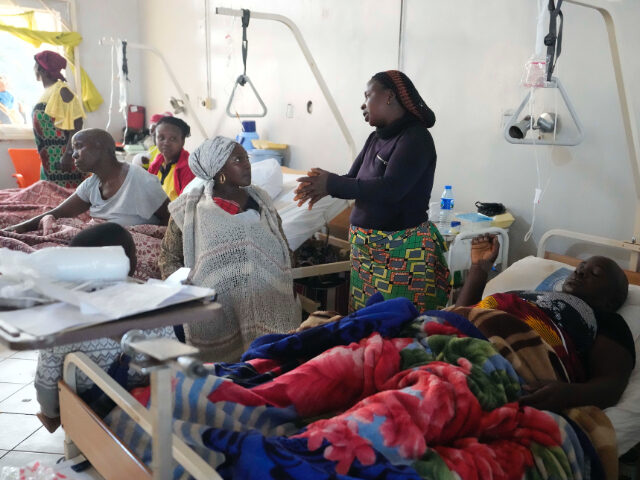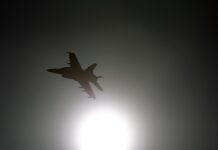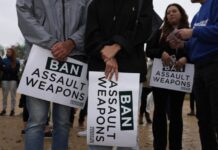Local authorities in Plateau state, Nigeria, updated the death toll of a presumed jihadist massacre of Christians beginning on Christmas Eve to 195 people on Thursday, warning that the arduous search for bodies in the bush continues and will likely add to the catastrophic number of lives lost.
Attackers identified in Nigerian media as “bandits,” believed to be members of the majority-Muslim Fulani ethnic group, went on a killing and pillaging rampage in the heart of Plateau beginning on Christmas Eve, burning down hundreds of homes and killing entire families. The mass murder, which law enforcement authorities described as “well coordinated,” was the latest in a string of killings that religious freedom advocates and Christians on the ground denounce as genocide — an attempt by the Fulani to eradicate the Christian presence in Nigeria’s Middle Belt region and usurp its territory.
The Middle Belt is the dividing line between Nigeria’s majority-Christian south and majority-Muslim north. Populations there, particularly in Plateau and Benue state, are predominantly Christian farming communities and have experienced a dramatic rise in genocidal violence on the part of Muslim Fulani who demand access to the farmland to graze cattle. As a result, some international voices claim the conflict is about the use of the land without a religious dimension and exacerbated by “climate change.” Local persecuted Christians aggressively reject this diagnosis.

The Nigerian newspaper Vanguard reported on Thursday that local authorities in Plateau had found 195 bodies of victims, and at least 10,000 people were displaced from their homes, adding to a population of millions of displaced Christians in the Middle Belt.
Vanguard detailed on Thursday that “1,290 houses were burnt down in Bokkos council, one house was razed in Mangu LGA and that of Barkin Ladi was yet to be ascertained at press time.” Barkin Ladi is one of the most severely affected communities by the “bandit” massacre and requires more time and effort to fully assess the damage there.

Local Bokkos leader Monday Kassa told the newspaper Daily Trust on Wednesday that the challenge to recovering the bodies is that many fled to the bush, the undeveloped area around the communities, and search operations are ongoing in difficult terrain.
“The situation on [the] ground now is not yet Uhuru [free]. We are working tirelessly with the search and rescue team to ensure we recover all the victims. Many residents are still missing; that is why we are still searching,” Kassa said. “Today (yesterday), we have recovered more than 20 bodies from the bushes, and the search is not over yet. In another one hour, you will see more bodies being brought from the bush.”
Mahanan Matawal, a local politician in Bokkos, Plateau, told the Nigerian newspaper Daily Trust that, in addition to displacement and killing, the survivors lost their homes and crops, threatening their secure access to food.
“You cannot quantify the food they have destroyed. A good number of houses were also destroyed. They killed more than a hundred innocent people, including children,” Matawal said. “We are asking the government to come to our aid.”

The governor of Plateau, Celeb Mutfwang, lamented on Tuesday that the attacks in his state had occurred for years with minimal federal government aid.
“When people are dislocated from their villages, and they have to run for shelter … if they stay away from those communities for a sustained period of time, the terrorists would come in,” Mutfwang said during a broadcast on the Nigerian outlet Channels TV on Tuesday. “As I am talking to you today (Tuesday), in Riyom Local Government, in Barikin Ladi Local Government, schools have been occupied by these terrorists for almost a number of years now.”
“We have not less than 64 communities that have been displaced, and their lands have been taken over by these terrorists,” he said. “I can tell you these schools that are being occupied, it didn’t just start now; some of those schools have been occupied in the last three, four, five years.”
The governor denounced:
Under the last regime [of former President Muhammadu Buhari] the feeling among people in Plateau State, particularly the victims of these terrorist attacks, is that it looks as if the terrorists were given official government backing to be able to terrorise them because little or nothing was done to repel these attacks.
Matawal, in the remarks to Daily Trust, noted that the “herders,” meaning the Fulani Muslim population, had, for years, been actively terrorizing Christians in the region.
“I know we have been having a series of problems with the herders in the area. They would always destroy your farm and tell you not to talk. When you complain, they attack you,” Matawal explained. “What was our offence? Even if cattle were rustled somewhere different from our communities, we should not be blamed for the atrocities.”

Fulani communities have responded to the massacres by blaming the Christians on the land. The Miyetti Allah Cattle Breeders Association (MACBAN), a Fulani group, claimed that Christians were “burning” Fulani homes and killing herders prior to the massacre without providing evidence.
“What baffled us is that security personnel were leading the operation. This we describe as security brutality, which is totally unacceptable. The Fulani, in general, are oppressed and stretched beyond elasticity,” a MACBAN official claimed, dismissing the Christmas Eve massacre as an “unfortunate incident.”
“That’s their (Miyetti Allah’s) opinion, and everyone is entitled to his or her opinion. We are not saying anything about the Plateau killings now,” a police commissioner told the Daily Trust.
A local Islamic leader, Sultan of Sokoto Sa’ad Abubakar III, insisted in an address on Wednesday that the killings did not have a religious dimension.
“Muslims, Christians, and even people who don’t have religion go to the same market, they buy the same foodstuffs, they enter the same vehicles, pay the same fares, so it is not the issue of religion,” the sultan said. “Let’s not say that anybody is planning this against Christians or against Muslims. No, it is the issue of leadership.”




